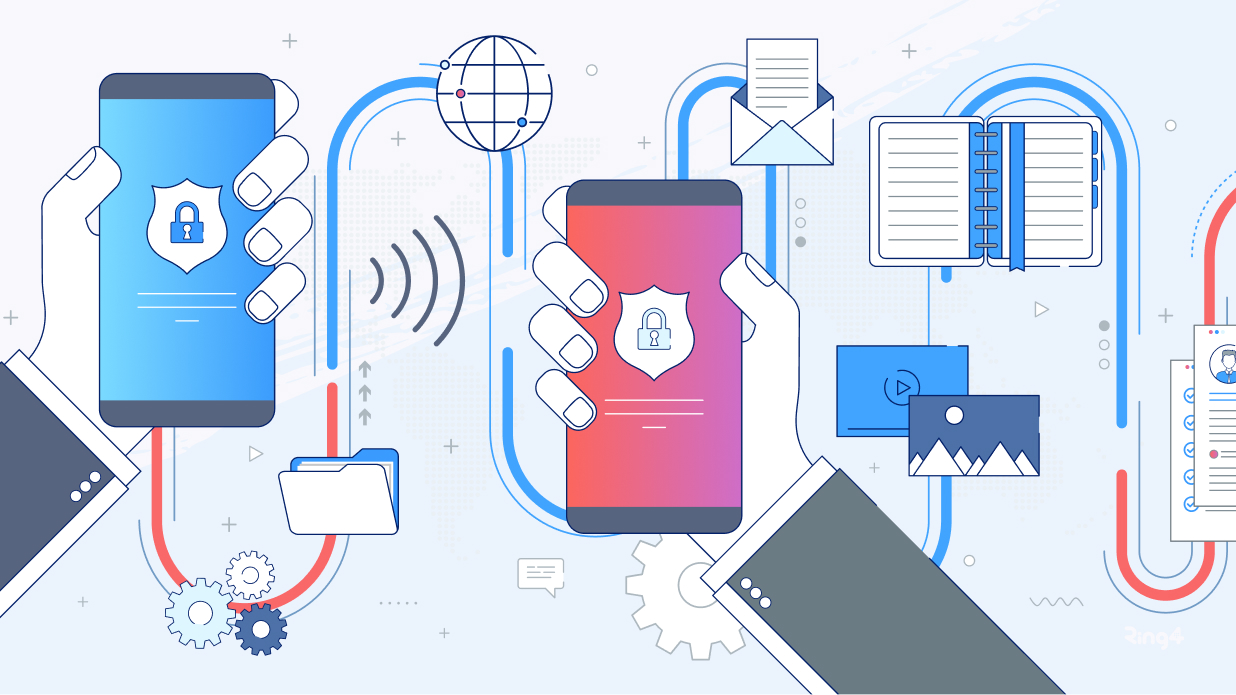Last year we reported that a rise in internet business phone security was one industry trend shaping the future of VoIP. Unsurprisingly, Harvard Business Review reported “83% of organizations experienced more than one data breach during 2022.” Tech.co shared “vulnerable loopholes in VoIP systems in 2023” are being targeted by hackers and cybercriminals.
The simple fact is, as internet business phones become the dominant medium for critical enterprise communications, adequately addressing potential security vulnerabilities is paramount. With growing reliance on VoIP platforms for seamless collaboration and customer interactions, businesses must take measures to protect sensitive call data from threats.
But, what are the threats that VoIP users should be aware of, and why is security so important? Let’s explore these questions.
Why should security be top of mind when considering using internet business phones?
Internet phones rely on VoIP technology which sends call data packets over the open internet, making it potentially vulnerable to eavesdropping if unencrypted. VoIP systems are also accessible remotely. This increases the attack surface vulnerable to intrusion.
Hackers already know that phone calls frequently contain sensitive information like customer data, sales records, financials, product details, etc… A breach of an internet phone system could allow these cybercriminals access to all of that juicy data.
In the best case, they will just mess with your systems for a day and cause minor disruptions. In the worst case though, they could ransom that data and cause damage to your reputation. This doesn’t even take into account the number of fines from any number of standards organizations you could be subjected to for not protecting your data
To put it mildly, the openness of internet-based phones makes them inherently high-risk if security is not implemented effectively. Given the central role communication systems now play in operations, securing VoIP platforms is imperative. Proactive defense-in-depth security allows organizations to fully leverage VoIP while avoiding compromised systems, breaches, regulatory non-compliance and other fallout from attacks.
What are the Top VoIP Internet Business Phones Security Threats?
Internet business phones and VoIP systems face a range of potential security threats that must be addressed. The most common threats are:
- Eavesdropping: Attackers intercepting and listening to calls containing sensitive information.
- Call interception: Rerouting calls to unauthorized devices to listen in.
- Phishing: Scammers using VoIP to mask caller IDs for phishing attacks.
- Denial-of-service (DoS): Overloading systems to cause service outages.
- Infrastructure attacks: Exploiting vulnerabilities in servers, routers or endpoints.
- Malware infections: Malicious code introduction that compromises VoIP performance and security.
Proactive threat assessments coupled with layered security measures are key to mitigate VoIP-specific risks for secure business communication over the internet.
A Quick Word on Encryption and Data Privacy

Encrypting VoIP call data is crucial for preserving confidentiality and protecting sensitive conversations. VoIP platforms should implement end-to-end encryption that secures information across the entire call path. Strong encryption like AES or TLS prevents eavesdropping and man-in-the-middle attacks. Strict data privacy policies also provide assurance that call metadata and recordings will be handled ethically. Together, robust encryption and responsible privacy practices enable secure communication over internet business phone systems.
You Should Also Use Authentication and Access Control
Powerful authentication and access controls safeguard against unauthorized usage of internet business phones. Multi Factor authentication adds an extra layer of identity verification before granting VoIP system access. Role-based access permissions prevent privileged account misuse. Promptly deleting ex-employee credentials also secures VoIP platforms. Proper authentication and access policies specific to VoIP critical for security of internet business phone services.
What are Some Network Security Measures You Can Implement?
Robust network security provisions are imperative for securing internet business phone systems. Firewalls block unauthorized VoIP traffic while intrusion detection spots anomalies. Network segmentation isolates VoIP infrastructure from other systems. VPN usage secures remote device access especially for mobile users wondering what is VPN on an iPhone and how it protects VoIP data on public networks. Prioritizing cybersecurity in the supporting network is foundational for mitigating VoIP-specific threats.
Don’t Neglect Those Vital Regular Software Updates
Promptly installing software updates and patches is vital for closing vulnerabilities in internet business phones before hackers can exploit them. VoIP platforms should be configured for automatic updates to maintain optimal security. Updates fix bugs, improve encryption, and enhance overall system security. Neglecting to update VoIP phone software constitutes a major security risk.
Two-Factor Authentication (2FA) for the Win!

At a minimum, consider using two-factor authentication (2FA). This provides an extra layer of security for VoIP platforms by requiring secondary credentials beyond just a password. Users may need to enter a code from an authenticator app or biometric like fingerprint to gain access. 2FA makes unauthorized account takeover significantly harder while imposing minimal burden on legitimate users. Enabling two-factor authentication is a highly effective way to improve the security of internet business phone services.
Be Sure Your VoIP Provider Offers Secure Call Routing
Internet business phones must utilize secure protocols and measures to prevent call hijacking or interception. VoIP platforms should enable verification of call destinations to avoid call forwarding to unauthorized numbers. Encrypting call setup data via SIP over TLS prevents Man-in-the-Middle attacks. Prioritizing secure call routing enhances the security of VoIP communication.
Your VoIP Provider Should Also Monitor for Threats
Continuous monitoring paired with regular audits improves the security posture of internet business phones. Monitoring systems detect potential threats and unusual user behavior. Scheduled audits verify configurations and identify vulnerabilities like out-of-date software. Together, close monitoring and frequent audits allow prompt identification and remediation of security gaps.
Are There Physical Security Measures You Should Consider?
Yes! Along with cybersecurity, physical security of VoIP infrastructure is paramount. VoIP servers, wiring and networking equipment must be securely stored in access-controlled facilities. Physical endpoint security also prevents theft and tampering. Strict physical security protections prevent direct attacks on internet business phone hardware.
If you’re using a mobile VoIP provider, there are some physical security measures you can implement personally as well. For example, keeping a password on your phone so if it does fall into the wrong hands, no one can get in and access your data. It’s also important to always be mindful of where your smart devices are at all times.
Let’s Talk Regulatory Compliance
Adhering to telecommunications and industry-specific regulations bolsters the security standing of internet business phones. HIPAA, PCI DSS, GDPR and other compliance frameworks include stipulations for encryption, data privacy, retention policies and breach notification. Confirming compliance builds trust and ensures responsible security practices.
Additional Practices to Implement for Top Notch Internet Business Phones Security
- Education and training: Educating employees about security best practices is critical for securing internet business phones. Users should be trained on strong password policies, social engineering red flags, mobile security, reporting suspicious activities and other areas. Building a culture of security through awareness empowers employees to help protect VoIP systems.
- Vendor Evaluation: When selecting internet business phone providers, rigorous evaluation of vendor security provisions is crucial. Examine encryption standards, data policies, access controls, patching cadence, compliance, certifications, auditing and other criteria. Favor vendors with a demonstrated commitment to security.
- Create a disaster recovery plan (just in case!): Robust disaster recovery and business continuity plans minimize disruption from security incidents. Backup VoIP data regularly in case of ransomware or outages. Ensure alternate calling plans in the event of service disruption. Prioritizing continuity strengthens overall security, as breaches become less impactful.
Where Do You Go From Here?
Comprehensive security is absolutely critical for organizations embracing internet-based business phone systems and Voice over IP (VoIP) communications. As enterprises become increasingly reliant on VoIP technology to connect global teams and customers, adequate protections against eavesdropping, data theft and service disruption must be proactively implemented through encryption, access controls, network security, timely patching, multi factor authentication, monitoring, and other best practices.
If you want to confidently use VoIP to its full potential, security must be a foundational pillar of your VoIP strategy rather than an afterthought. Otherwise, you could be putting sensitive communications and infrastructure at undue risk.
With strong precautions in place, businesses can stay focused on driving growth through seamless calling, conferencing and collaboration capabilities over the internet.
Ready to experience a secure, enterprise-grade VoIP business phone for yourself? Try Ring4 for free for 7 days - the affordable and easy online phone system that works with the smartphone you already have. Click here to try it today with no credit card required!

